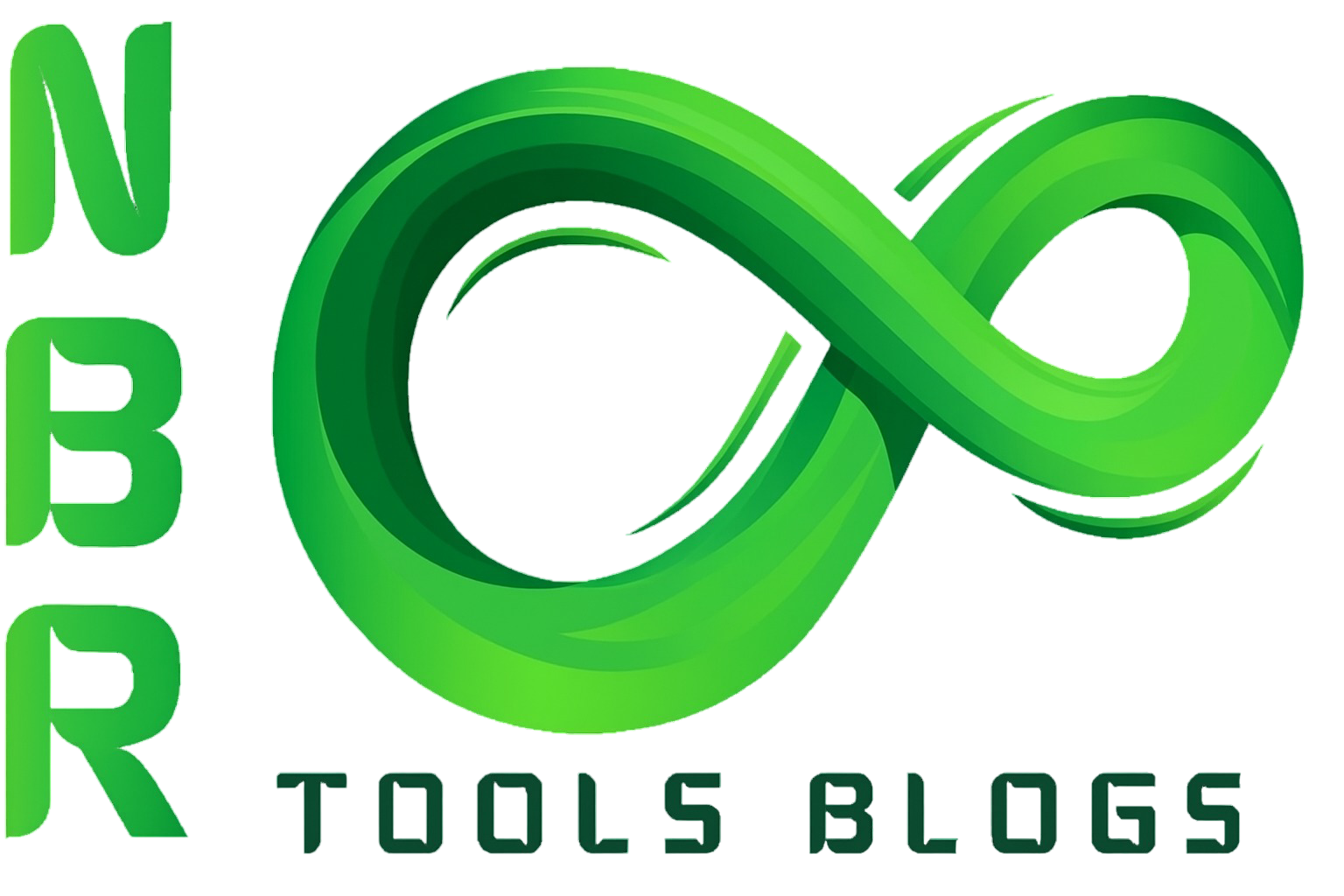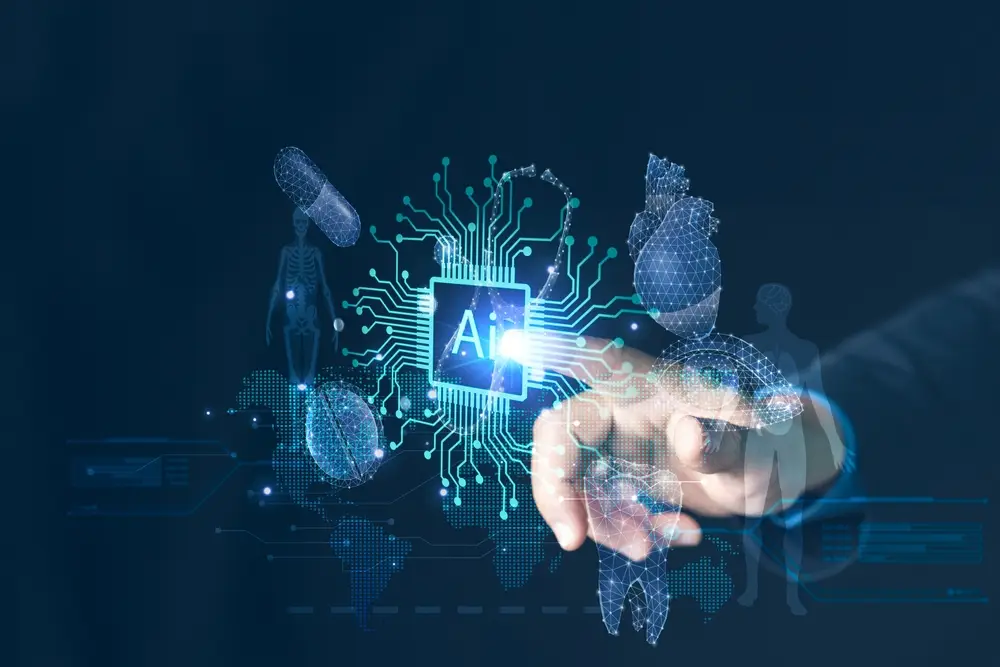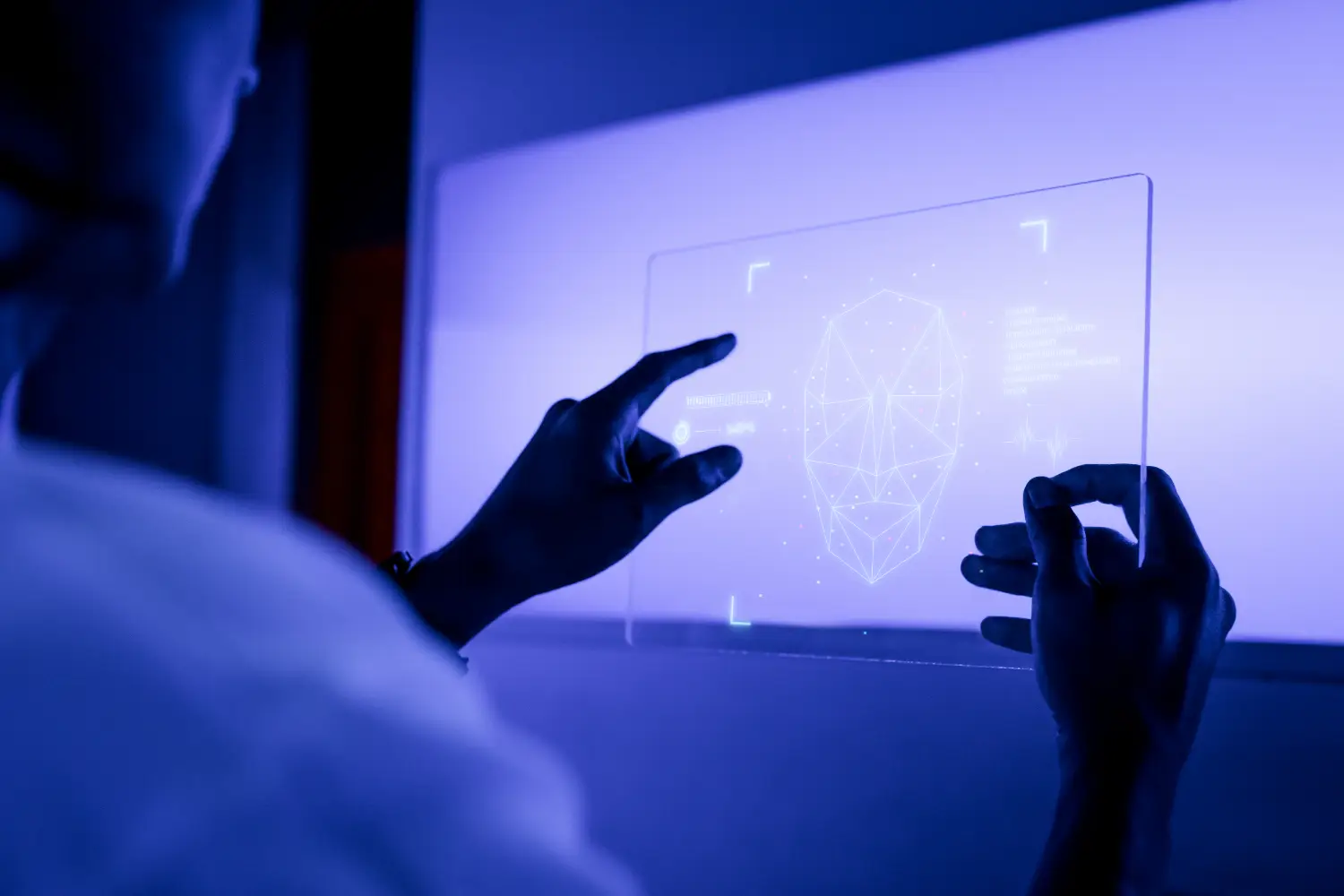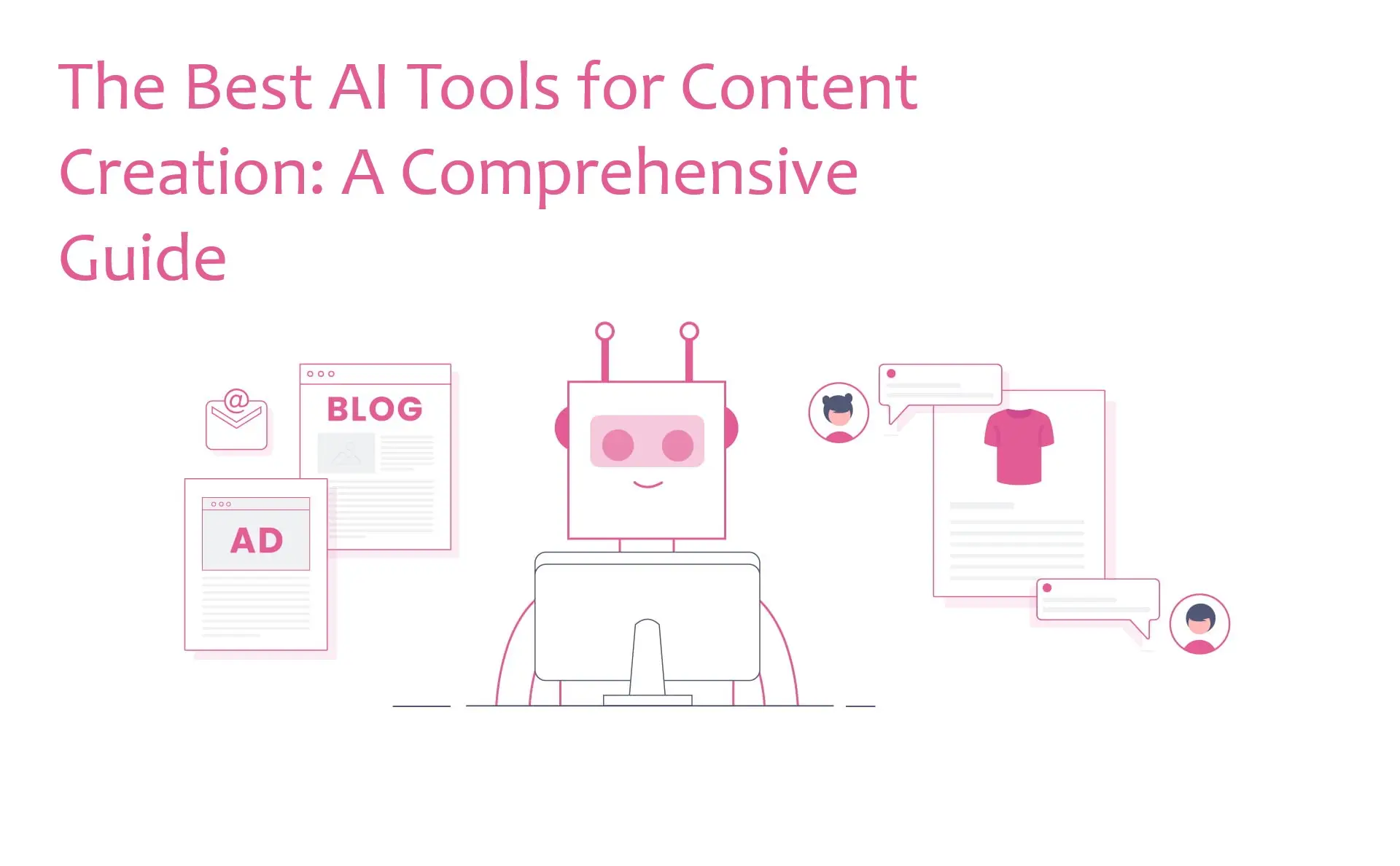A potent and rapidly evolving technology called Artificial Intelligence (AI) enables machines to simulate human intelligence and perform complex tasks that once required human expertise. It encompasses several crucial fields such as machine learning (ML) — where computers learn from data and improve over time without explicit programming — deep learning, a more advanced branch of ML that mimics the human brain through neural networks, and natural language processing (NLP), which allows machines to understand, interpret, and respond to human language in a meaningful way. Together, these technologies are reshaping how industries operate, innovate, and deliver value.
Among the many industries benefiting from AI, healthcare stands at the forefront of this digital revolution. AI is transforming the way doctors, nurses, and medical researchers work — from automating administrative tasks to assisting in robotic surgeries and improving diagnostic accuracy. By analyzing vast amounts of patient data, AI systems can detect early signs of diseases like cancer, diabetes, and heart conditions, often with greater precision than traditional methods. This not only enhances the speed and reliability of diagnoses but also allows for personalized treatment plans tailored to each patient’s unique medical history and genetic profile.
Moreover, AI-powered tools are improving medical imaging, accelerating drug discovery, and enabling remote patient monitoring, which has become vital in telemedicine and elderly care. Hospitals are using AI-driven chatbots to streamline patient communication, while researchers leverage predictive analytics to anticipate outbreaks and manage healthcare resources more efficiently.
However, as promising as AI is, it also brings challenges related to data privacy, ethics, and algorithmic bias. Despite these hurdles, the potential of AI in healthcare remains limitless. With continuous innovation and responsible implementation, AI is paving the way for a future where healthcare becomes smarter, faster, and more accessible for everyone.
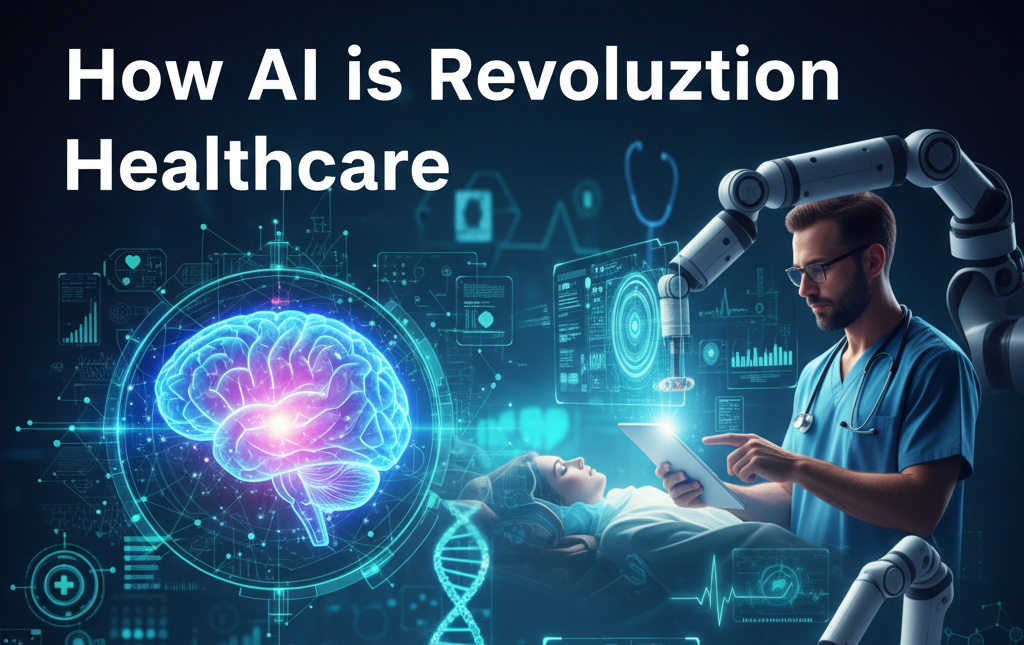
Applications of How AI is Revolutionizing Healthcare
AI is assisting in numerous healthcare domains. Here are a few instances:
1. Identification and Management
Physicians can identify illnesses more quickly and precisely with the use of AI techniques. For example:
- Image Analysis: AI systems examine CT, MRI, and X-ray images to look for early indicators of conditions like cancer or heart issues. Patients can receive treatment sooner as a result.
- AI Predicts Outbreaks: By analyzing trends in medical records, AI forecasts the spread of illnesses, assisting hospitals in better planning.
Personalized medicine is also supported by AI. This implies that physicians develop treatment regimens based on personal characteristics such as lifestyle and heredity. For instance, AI can recommend the best course of action for a patient if they have a particular gene associated with a condition.
2. Drug Development and Discovery
The process of developing new medications is typically drawn out and costly. AI accelerates it by:
- minimizing the need for laboratory testing by simulating how medications interact with the body.
- estimating which medication combinations may be most effective for particular illnesses.
3. Assistance and Robotics in Surgery
Robots driven by AI help perform surgery with more accuracy. These robots are capable of:
- Help patients recuperate more quickly by performing delicate procedures with less cuts.
- Improve safety and results by providing surgeons with real-time guidance.
4. Administration of Healthcare
Healthcare professionals save time by using AI to handle non-medical activities. It is capable of:
- Make appointments automatically.
- Handle insurance claims more quickly.
- Estimate staffing requirements to guarantee hospitals have an adequate number of physicians and nurses.
5. Telehealth and Remote Patient Monitoring
Smartwatches and other AI-powered gadgets track patients’ health in real time. These devices can monitor heart rates, identify anomalous trends, and promptly notify medical professionals. People in remote locations can now get healthcare thanks to telehealth systems that utilize AI to link patients and doctors for virtual consultations.
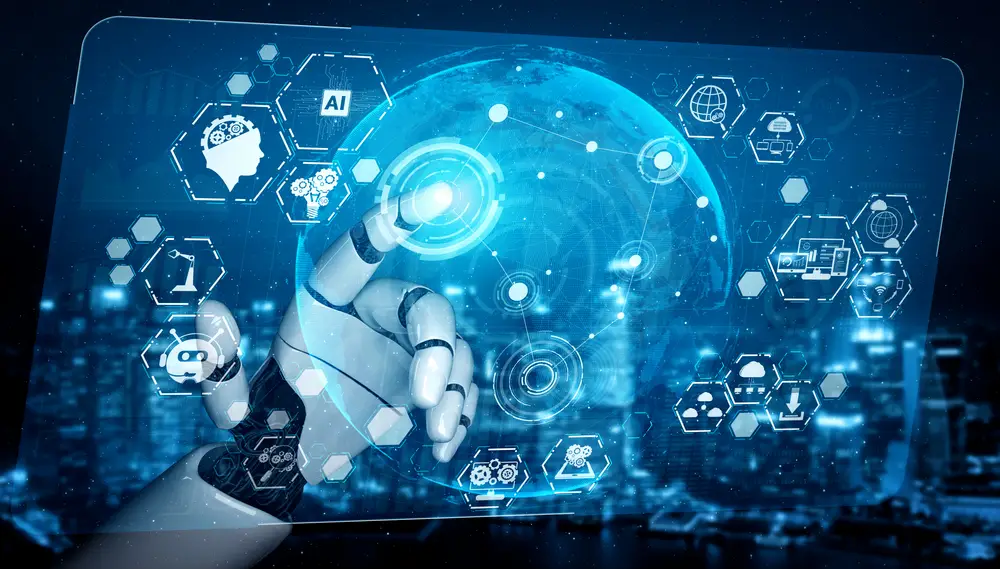
AI’s advantages in healthcare
Artificial Intelligence (AI) is transforming the healthcare industry in remarkable ways, improving patient outcomes, enhancing productivity, and making medical services more accessible and efficient. By integrating machine learning algorithms, data analytics, and automation, AI is helping healthcare professionals deliver faster, safer, and more personalized care. Let’s take a deeper look at some of the main advantages that AI brings to the healthcare field.
1. Improved Results for Patients
One of the most significant impacts of AI in healthcare is the improvement of patient outcomes.
AI-powered systems can analyze vast amounts of data — from medical records and lab results to imaging scans and genetic information — to identify patterns that might go unnoticed by human eyes.
Early Detection and Diagnosis
AI assists in the early detection of diseases, allowing doctors to begin treatment before conditions worsen. For instance, machine learning algorithms can detect early signs of cancer, diabetes, or cardiovascular diseases through imaging scans or blood test results. Early diagnosis not only improves survival rates but also reduces the cost and complexity of treatment.
Fewer Medical Errors
AI reduces the likelihood of human errors by processing data with incredible accuracy. Automated systems help cross-check prescriptions, flag risky drug interactions, and ensure that patients receive the right medications and dosages. This leads to safer care and minimizes complications.
Personalized Treatment Plans
AI enables personalized care, tailoring treatments to each patient’s unique health data. By considering factors such as age, genetics, medical history, and lifestyle, AI helps doctors design customized therapy plans that are more effective and have fewer side effects.
2. Enhanced Productivity and Efficiency
AI is also revolutionizing the operational side of healthcare by automating time-consuming administrative tasks.
Automation of Routine Tasks
From scheduling appointments and managing electronic health records to billing and insurance claims, AI handles repetitive work efficiently. This automation frees up valuable time for doctors, nurses, and administrative staff, allowing them to focus more on patient care.
Cost Reduction
AI also plays a major role in reducing healthcare costs. It helps prevent diseases through early detection and predictive analytics, which minimizes hospital admissions and unnecessary procedures. Additionally, AI assists hospitals in optimizing resource management — ensuring that equipment, beds, and staff are utilized efficiently.
Workflow Optimization
AI tools like predictive analytics and smart hospital management systems streamline operations, reduce waiting times, and improve coordination between departments. This leads to smoother workflows and better overall patient experiences.
3. Enhanced Accessibility and Usability
AI is bridging the gap between healthcare providers and patients by making healthcare more accessible and user-friendly, especially for those in rural or underserved areas.
Telemedicine and Virtual Consultations
AI-powered virtual assistants and chatbots allow patients to consult doctors remotely, removing geographical barriers. These systems can analyze symptoms, provide preliminary advice, and connect patients with the right specialists — saving time and travel costs.
Wearable Health Devices
Smart wearable devices like fitness trackers and health monitors use AI to track real-time health data, including heart rate, oxygen levels, and sleep patterns. Patients can monitor their health from home, and doctors can remotely access the data to provide better guidance. This continuous monitoring helps detect early warning signs and prevent emergencies.
Language and Accessibility Support
AI-based translation tools and voice assistants also make healthcare more inclusive by helping patients who speak different languages or have disabilities communicate effectively with healthcare providers.
4. Faster Medical Research and Development
AI is accelerating medical research and drug development at an unprecedented pace.
Data-Driven Insights
Researchers can now analyze massive datasets — including genomic data, clinical trials, and global health statistics — in a fraction of the time it would take manually. This helps uncover new insights into how diseases develop and spread.
Drug Discovery and Testing
AI algorithms simulate how different compounds interact with the human body, drastically shortening the time needed for drug discovery and reducing the costs of clinical trials. This means new treatments can reach patients faster than ever before.
Precision Medicine
AI enables scientists to develop precision medicine, which tailors drugs and therapies to an individual’s genetic makeup. This personalized approach leads to more effective treatments with fewer side effects.
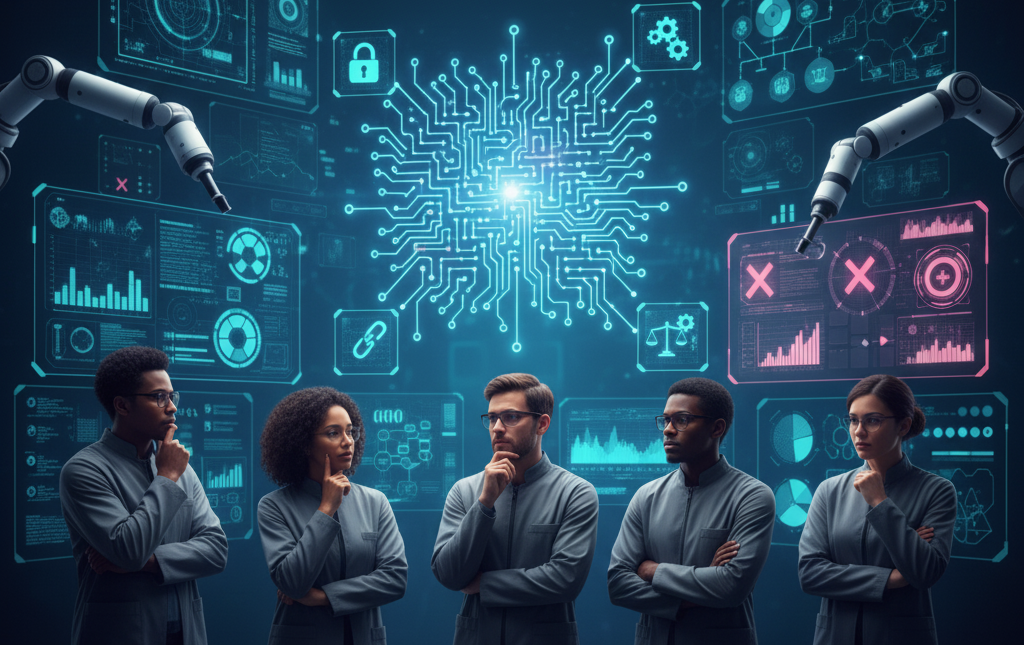
Obstacles and Things to Think About
Despite its numerous advantages, artificial intelligence has drawbacks.
1. Security and Privacy of Data
AI cannot function without patient data. It is essential to protect this data from hackers. To safeguard patient privacy, hospitals must implement robust security measures.
2. Moral Issues
- Bias: If AI is taught on biased data, it may be unjust.
- Job Loss: Some healthcare jobs may be replaced by automated processes.
3. Problems with Integration
To use AI tools, healthcare systems must be modernized. This might take a lot of time and money.
4. Openness
Because AI algorithms can be complicated, it can be challenging for patients and physicians to comprehend how choices are made. Building confidence requires giving precise explanations.
5. Difficulties with Regulation
To guarantee AI is applied in healthcare in a safe and moral manner, governments must establish regulations.
AI’s Potential in Healthcare
AI is still developing and getting better. The following are some trends and forecasts:
1. New Uses
- Mental Health: By examining speech and behavior patterns, AI is assisting in the detection of anxiety and sadness.
- Personalized Nutrition: AI uses health data to provide personalized diet regimens.
2. Completely Coordinated Systems
AI may eventually be able to run whole hospitals. It could manage scheduling, anticipate the need for medical supplies, and organize patient care, for instance.
3. Continued Investigation
In order to address more complicated issues, like as detecting pandemics or curing rare diseases, scientists are creating increasingly intelligent AI systems.
In conclusion
AI is revolutionizing healthcare in amazing ways. Patients are living healthier lives as a result of it, from early disease diagnosis to safer surgery. However, to guarantee AI is utilized properly, issues like privacy and ethics must be resolved.
It’s critical to keep up with the latest developments in AI as it develops. Everyone will have access to better healthcare in the future if we embrace this technology and use it responsibly.
